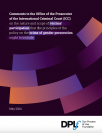DPLF recently submitted a comment responding to a call from the International Criminal Court (ICC) Office of the Prosecutor for input on how victim participation should be ensured in the principles of its policy on the crime of gender-based persecution. International human rights law and international human rights protection bodies have established that the persecution of individuals, groups of people, or communities entails serious violations of civil, political, and economic, social, and cultural human rights. Gender persecution is one such violation.
As a civil society organization dedicated to the promotion of the rule of law and human rights in Latin America, DPLF supports the Office of the Prosecutor’s commitment to seeking accountability for the crime against humanity of gender persecution. This commitment has been reflected in, among other actions, the investigations and filing of charges for this serious crime in several cases brought before the Court and in the adoption of the Policy on the Crime of Gender Persecution of December 2022.
In our recent submission, we highlight some elements that are already present in several policy documents of the Office of the Prosecutor that we consider relevant in defining the nature and scope for preventing this crime and protecting victims’ rights, which the principles of the policy on the crime of gender persecution ought to include. These elements are: (i) due diligence; (ii) a systemic approach to the discrimination underlying gender persecution; (iii) an intersectional perspective; and (iv) the victim-centered and people-centered approach to justice. The comments on these topics are presented in light of paragraphs 1(b) and 3 of Article 21 of the Rome Statute.
In international criminal law, gender persecution was first categorized as an international crime and crime against humanity in the Rome Statute of the International Criminal Court (ICC). The ICC has referred to the crime of persecution as a particularly heinous crime of the highest gravity. The crime of persecution may be gender-based, and in itself entails the objective of discrimination, since it is a crime that identifies or is directed against persons or individuals on the basis of their sex characteristics and/or the social and cultural constructs and criteria used to define gender-determined behaviors, roles, attributes, and responsibilities.
Download document here.






